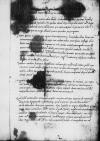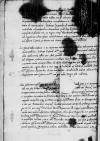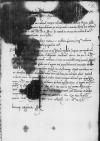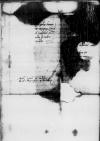Habuimus ⌊⌋ Strenuitatis Tuae datas ⌊Augustae⌋
1530-09-20⌊20 mensis praeteriti Septembris1530-09-20⌋, ex quibus simul et ex compendio sacrae maiestati regiae transmisso abunde omnia intelleximus, quae nostra intersunt et quae nos scire voluit Strenuitas Tua. Ad haec igitur, quae nos magis attinent, paucis speciatim perstringemus.
⌊Ioanni Levicio⌋ scribit Strenuitas
Tua rogans, ut commisereremur. Iam pridem ⌊illum⌋ litteris nostris revocavimus et querenti se non posse sine viatico redire commisimus e vestigio aliis litteris nostris ⌊Ioanni Iacobo de Dugnano⌋, ut nostro nomine centum quinquaginta aureos illi numeraret, tum pro solutione debiti per eum, ut asserebat, contracti, tum etiam pro viatico ad nos redeundi. Quod hactenus ⌊Venetiis⌋ immoratur, nos in culpa non sumus, cogetur tamen vel inhactenus coactus est per magnificum ⌊Ludovicum Aliphium⌋ oratorem regium et nostrum illinc solvere.
Dolemus mortem ⌊viceregis Neapolitani⌋, sed quia haec nullo modo evitari potest, aequiore ferre animo necesse est. Faxit Dominus Deus, ut alter cito surrogetur et is, qui rebus nostris saltem pro iustitia et aequitate faveret, de quo, cumprimum aliquid decretum fuerit, faciat nos [Strenuitas Tua ce]rtiores.
Legimus ...[ t]ragoediam scriptam de ⌊Scipione de Summa⌋, qui nuper ad curiam caesa..., ut paucis respondeamus, volumus, ut sicut coepit, Strenuitas Tua cum eo agat, se ...det, contra vulpem vulpiset(!), donec res hunc vel illum consequetur finem. Quod ubi cesserit, statim nos scire faciat.
Quod nihil metuendum rebus nostris censet Strenuitas Tua, tam ab ipso ⌊Scipione de Summa⌋, quam eius fratre ⌊Sigismundo Lofredo⌋, eo quod apud ⌊caesarem⌋ iste non bene audiat, nos in rebus nostris diversum experimur. Nam ⌊Lofredus⌋ in ⌊regno Neapolitano⌋ quicquid facit, totum concilium collaterale ratum et gratum habet, negotia nostra impediuntur, mandata ⌊caesaris⌋ obaudiuntur et impune semper. Nam adoham, quam Strenuitas Tua a ⌊caesarea maiestate⌋ pro nobis impetraverat, tanto tempore relaxare procrastinati sunt ⌊illius regni⌋ consiliarii, quod secunda supervenit adoha et compulerunt nos ad v...am per Tuam Strenuitatem impetratae ... felicis memoriae illustrissimam ⌊matrem nostram⌋ ... per Tuam Strenuitatem impetrata nobis adhuc non est admissa. Imo ...nt et contendunt in contemptum mandatorum sacrae ⌊caesareae [maiestatis]⌋ [in damnum q]ualecumque nostrum et incommodum. Praeterea imposita est noviter in ⌊Regno Neapolitano⌋ quaedam contributio ad exsolvendum stipendium militibus Hispanis, qui illic remanserant, ut habito stipendio suo ex Regno Neapolitano discederent, cum iam ex gratia Dei pax sit, cogunt nos etiam ipsam contributionem solvere promittentes dum solutio reddetur ad fiscum caesaris ex ⌊ducatu nostro⌋ totam ipsam summam defalcare.
Scripserat nobis antea Strenuitas Tua se missuram nobis per ⌊Bernardum fratrem⌋ suum aut aliqu[em] alium fidelem litteras ⌊caesareae maiestatis⌋ exspeditas remissionis omnium adoharum Illustrissim[ae] olim ⌊matris nostrae⌋, quod si iam sunt expeditae et subscriptae, eas nobis per ⌊fratrem⌋ suum vel aliquem certum et securum nuntium transmittat, quo possimus illas in ⌊ducatum nostrum⌋ transmittere et ab his difficultatibus, quae nobis ingeruntur immunes esse. Agat etiam Strenuitas Tua cum domino ⌊Valdesio⌋, ut litterae et mandata ⌊caesareae maiestatis⌋ firmius observentur et non omittantur sicut omitti solent. Nam in ⌊Regno Neapolitano⌋ non ⌊caesarea maiestas⌋, sed offi[c]iales reges esse videntur.
Non potuimus intelligere, quinam isti s... [du]cati, quos Strenuitas Tua conqueritur sibi non esse solutos a magnifico ⌊Ioanne Iacobo de [Dugnano thesaur]ario⌋ nostro Barensi, cui ... scripseramus omnino habere volentes, ut ... [Ve]lseris pecuniam solveret per Tuam
Strenuitatem acceptam secundum constitutionem s[a]larii Strenuitatis Tuae, centum videlicet ducatos pro singulis mensibus, usque per totum mensem Aprilem anni istius, ac deinceps commisimus Strenuitati Tuae per ⌊Bernardum⌋, ut apud ⌊Fucaros⌋ pecuniam acciperet, quibus ex mandato regio et nostro per magnificum ⌊Severinum Bonar⌋ zupparium et magnum procuratorem Cracovie[nsem] multo commodius ad praesens responderetur, ubi in hanc regionem Strenuitas Tua pervenit, scribitque nobis ⌊thesaurarius noster Barensis⌋ litteris suis datis 1530-07-15⌊15 mensis praeteriti Iulii1530-07-15⌋ se persolvisse ⌊Velseris⌋ pro Strenuitate Tua trecentos ducatos auri per eius antecessorem ⌊Nicolaum Carminianum⌋ thesaurarium nostrum retentos.
Proinde si quid retentum fuerit, nescimus. Commisimus autem verbotenus et nunc litteris nostris magnifico [Ludovico] Aliphio ...t ... thesaurario quatenus ... in mensem praeteritum Aprilem inclusive totum absque omni mora solvatur. ... diebus cum non aderat tempus solvendi stpendii aulicis regiis facto calculo cum thesaurario regio dedimus ex nostris pecuniis in manus ⌊Nipcicz⌋ pro solutione totius stipendii Strenuitati Tuae florenos 670 grossos 20 in moneta in aureos commutandos et Tuae Strenuitati sine mora transmittendos, ita ut petiit.
... in bona fama expeditum mittat Strenuitas Tua Venetias quamprimum magnifico Ludovico Al[iphio] [servi]tori nostro, quod nobis pergratum erit.
Pla[cet nobis], quod Strenuitas Tua convenerit cum magnifico ⌊Cornelio Dupplicio Sceppero⌋, qui negotia nostra ap[ud] caesaream maiestatem fideliter et diligenter tractaret, dum Strenuitas Tua per serenissimam ⌊maiestatem regiam⌋ et nos revocata fuerit, volumus, ut cum eo concludat
nosque paratae sumus illi dare singulis annis, quamdiu res et negotia nostra expostulaverint ducentos ducatos auri, hoc tamen nos aliquantulum movet, ne, ut est coniugi et forte iam liberis ac rei domesticae afflictus, derelictis rebus nostris ad bona sua interdum abeat. Proinde in locum suum si quando [a]bierit, talem virum surrogare deberet, qui apud ⌊caesaream maiestatem⌋ non p...t, sed bonam haberet assistentiam et negotia nostra fideliter ac dilig[enter tracta]ret. Haec ubi Strenuitas Tua cum eo nostro nomine disseruerit, quid ad... apud ⌊Velseros⌋ aut ⌊Fucaros⌋ ipsos ducentos ducatos accipere qu..., reddat nos certiores Strenuitas Tua.
Quae bene et feliciter valeat.



